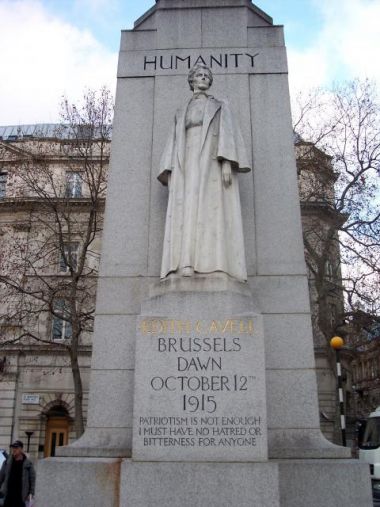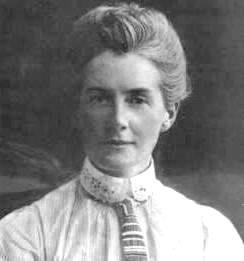Faith under fire: The astonishing story of Edith Cavell, shot 100 years ago today

Just outside the National Portrait Gallery off Trafalgar Square in central London is a memorial to a remarkable woman.
It's fair to say that most of the thousands who pass it every day won't know much, if anything, about her. But Edith Cavell was, in her way, a modern martyr. The square's other memorials are to those who were rather good at taking lives. Her glory was that she tried to save them.
An English nurse working in Belgium – she helped found the profession there and is revered as the Belgian Florence Nightingale – she was shot by the Germans 100 years ago today. Her crime was helping injured prisoners to escape.
In words that have echoed down the last century, she said to the chaplain the night before she died: "Standing as I do in view of God and eternity, I realise that patriotism is not enough. I must have no hatred or bitterness towards anyone."
For Catherine Butcher, whose book Edith Cavell: Faith before the firing squad (Monarch, £8.99) tells her story, those words express first and foremost a Christian faith that's all too often airbrushed out.
"She couldn't die holding bitterness in her heart," she says. "She would stand before God and she wanted to be forgiven, so she would have to forgive."
Edith Cavell was the daughter of a clergyman, an educated woman but without financial resources. Born in 1865 in rural Norfolk, she was brought up in the low church evangelical tradition, with family life revolving around prayers and services. Her faith was serious and personal, though she found her father's sermons dull.
Edith was moved by the plight of the inmates of the local workhouse, writing to her cousin Eddy: "Some day I am going to do something useful. It must be something for people. They are most of them so helpless, so hurt and so unhappy."

Her first employment was as a governess in a succession of families. She later trained as a nurse, choosing to work in difficult settings like workhouse clinics rather than the easier option of private nursing.
The outbreak of war found her in England, but she decided to return to Brussels to her training hospital. Despite Belgian resistance, the city was soon occupied and it was not long before stories of German atrocities began to circulate. In Dinant 674 men, women and children were shot in the town square. Louvain, only 20 miles from Brussels, was burned and the population massacred.
Rather than make her escape to England, though, she chose to stay and carry on with her nursing work.
As the war progressed in 1915, however, she became involved not just in treating wounded British soldiers but in helping others get back to the front. German agents infiltrated the hospital, mail was intercepted and she came increasingly under suspicion. She was arrested on August 5, interrogated and tricked into signing statements in German that she could not read. She admitted helping soldiers to return to England. On Monday October 11, with four other 'conspirators', she was sentenced to be shot.
She spent her last days in prayer, reading the Bible and books of devotion. During her 10-week imprisonment she read the Prayer Book, the Pilgrim's Progress and Thomas a Kempis' Imitation of Christ, marking many significant passages.
On her final day, she was visited by the Anglican chaplain, her friend Stirling Gahan. Gahan later recorded: "We partook of the Holy Communion together, and she received the Gospel message of consolation with all her heart. At the close of the little service I began to repeat the words, 'Abide with me', and she joined softly in the end.
"We sat quietly talking until it was time for me to go. She gave me parting messages for relations and friends. She spoke of her soul's needs at the moment and she received the assurance of God's Word as only the Christian can do.
"Then I said 'Good-by,' and she smiled and said, 'We shall meet again.'"
She was then taken out and shot.
Catherine Butcher says that she was under no illusion about the risks she ran, but that she had to help those she believed were in danger of death. "She thought that if she didn't help them, they'd be shot," Butcher says. "Life was sacred to her. She knew what she was risking. There was no suggestion that she didn't agree she was guilty."
Though, she adds, Cavell may have hoped that they would not execute a woman; she even sent for some winter clothes in case she was imprisoned instead.
For Butcher, it is her last words that are more significant than the famous quote on her statue, because it speaks so clearly of the Christian faith which shaped her life and let her meet her death in such a composed and courageous way.
"She said, 'We will meet again'. For me, that's a possibility for all of us," she says.
Follow @RevMarkWoods on Twitter.











